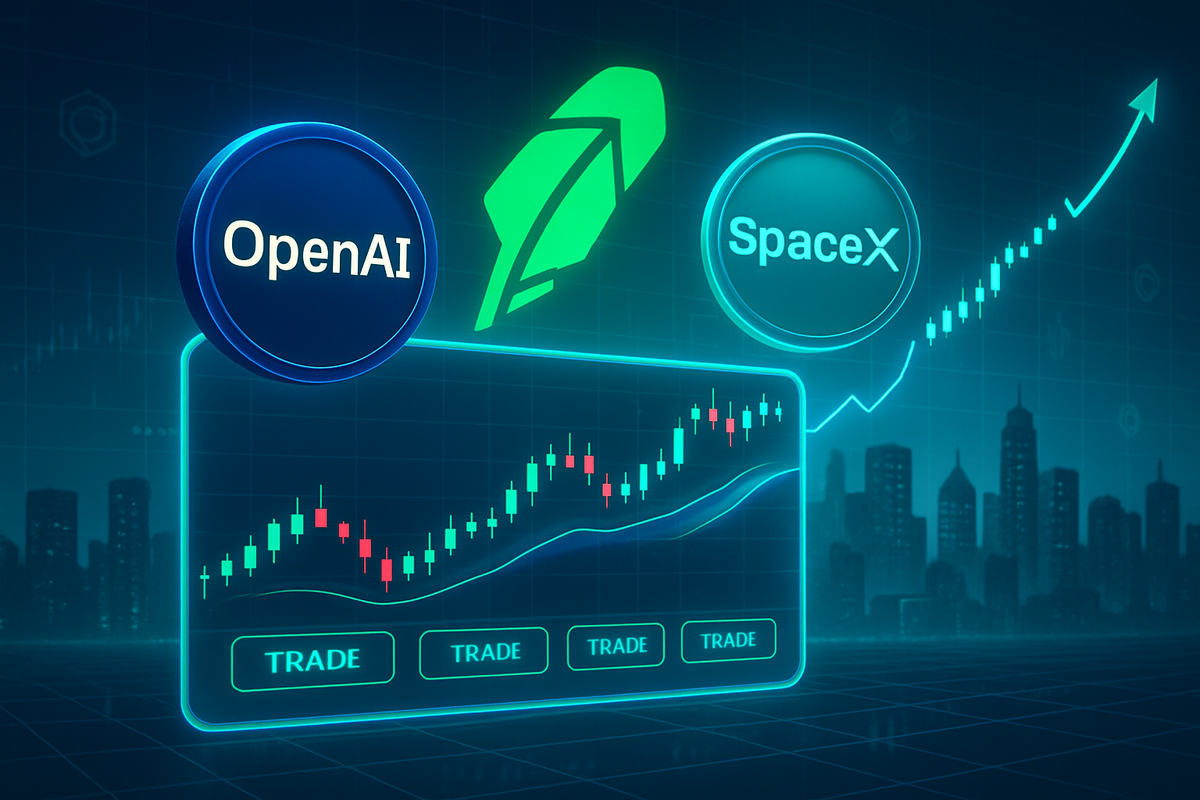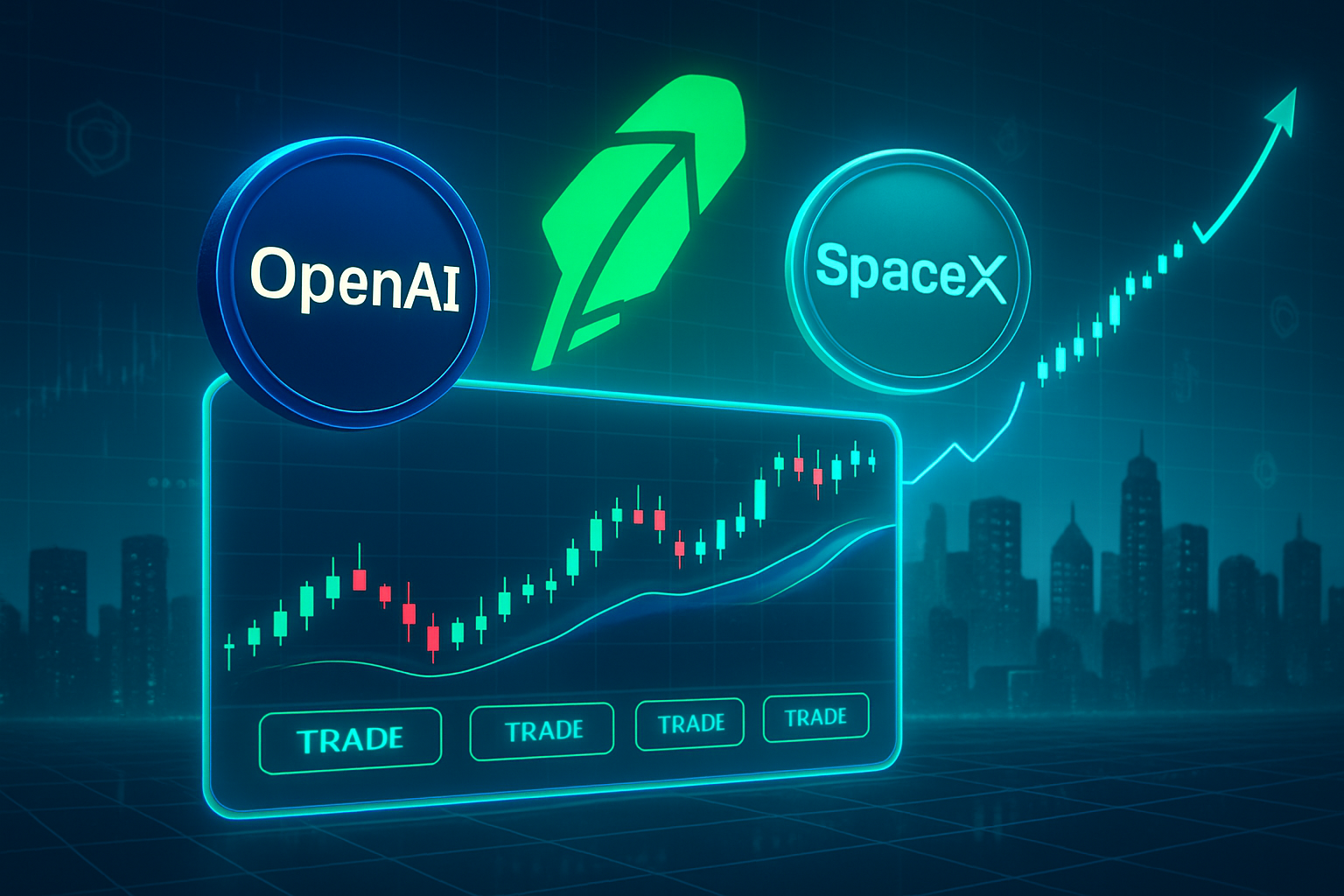Robinhood Unleashes Tokenized Shares of OpenAI and SpaceX as Stock Soars to Record High (NASDAQ:HOOD)


Robinhood has once again captured Wall Street’s attention, this time by launching tokenized shares of two of the world’s most sought-after private tech giants: OpenAI and SpaceX. In a dramatic move that blends the boundaries of public and private investing, the popular brokerage platform announced that select users could now buy and sell digital tokens tracking the value of these elusive companies, sending Robinhood’s own shares (NASDAQ:HOOD) to record highs.
A New Frontier in Investing
Robinhood, long known for democratizing stock trading and commission-free investing, is leveraging blockchain technology to offer access to companies previously out of reach for everyday investors. OpenAI, the artificial intelligence powerhouse behind ChatGPT, and SpaceX, the rocket company spearheaded by Elon Musk, have both achieved sky-high valuations in the private markets but remain off-limits to most retail traders.
The new tokens represent fractionalized economic exposure to the future performance of these firms, allowing Robinhood users to invest in high-growth tech icons without the wait for traditional IPOs. Each token is backed by a basket of synthetic contracts and, according to Robinhood, is fully compliant with current regulatory standards. The platform’s blockchain infrastructure enables secure trading, immediate settlement, and transparent proof-of-ownership.
How Tokenized Shares Work
Tokenized shares are not the same as owning direct equity. Instead, they mirror the price movement of underlying private company shares, often using swaps, synthetic derivatives, or contractual claims managed by partner institutions. In this model, Robinhood acts as the intermediary, using its own partnerships with private funds, market makers, or digital asset firms to source and track the value of OpenAI and SpaceX equity.
Robinhood’s tokens can be traded 24/7 on its app, reflecting real-time pricing derived from secondary markets, private funding rounds, and any available trading data for the underlying firms. The system is designed to allow fast entry and exit for investors, all within the familiar Robinhood interface.
Market Impact: Robinhood’s Stock Skyrockets
The announcement triggered a frenzy on Wall Street. Shares of Robinhood (NASDAQ:HOOD) surged to all-time highs as investors bet on the company’s ability to monetize this new offering, attract a fresh wave of users, and secure a technological lead over rivals. Analysts pointed to the first-mover advantage in bringing private tech exposure to retail traders—especially with two of the most hyped companies on the planet.
Trading volumes on Robinhood’s platform spiked as users clamored to acquire fractions of OpenAI and SpaceX, and industry observers predicted that other platforms would soon try to follow suit. The innovation opens the door to a broader trend of tokenizing illiquid or hard-to-access assets, from pre-IPO shares to real estate and venture capital funds.
Private Markets Go Public
For years, the hottest tech companies have chosen to stay private, raising billions from venture capital and delaying IPOs for as long as possible. This has left retail investors on the sidelines, unable to participate in the explosive growth of firms like OpenAI and SpaceX until late in their lifecycle. Robinhood’s move flips the script, bringing some of that value creation to Main Street and potentially reshaping how the next generation invests.
By offering tokens backed by contractual claims rather than direct shares, Robinhood sidesteps many of the legal and regulatory barriers that have traditionally kept private markets closed. Still, the model is not without risk—token prices can diverge from the value of the underlying company, liquidity may be limited in times of stress, and investors don’t receive the same rights as traditional shareholders.
The Broader Implications
The launch of OpenAI and SpaceX tokens on Robinhood is seen by many as a milestone for both crypto infrastructure and financial inclusion. Blockchain-based assets continue to gain legitimacy as more mainstream institutions embrace their potential for fractionalization, efficiency, and accessibility. If successful, this experiment could accelerate the shift toward a more open, interconnected financial system—one where nearly any asset, public or private, can be traded by anyone, anywhere, at any time.
For Robinhood, the move further cements its identity as an innovator in retail finance and may spark renewed growth as traditional stock trading platforms search for ways to keep up.
Disclaimer:
This article is for informational purposes only and does not constitute investment advice or a recommendation to buy or sell any securities or assets. Investors should conduct their own research and consult with a licensed financial advisor before making investment decisions.



